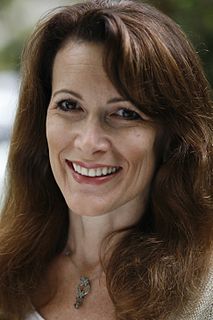A Quote by John Major
[on Queen Mother] Our country is the richer for her life and the poorer at her death.
Related Quotes
But her name was Esmé. She was a girl with long, long, red, red hair. Her mother braided it. The flower shop boy stood behind her and held it in his hand. Her mother cut it off and hung it from a chandelier. She was Queen. Mazishta. Her hair was black and her handmaidens dressed it with pearls and silver pins. Her flesh was golden like the desert. Her flesh was pale like cream. Her eyes were blue. Brown.
Her [Eleanor Roosevelt] father was the love of her life. Her father always made her feel wanted, made her feel loved, where her mother made her feel, you know, unloved, judged harshly, never up to par. And she was her father's favorite, and her mother's unfavorite. So her father was the man that she went to for comfort in her imaginings.
Her mother was a Christian Scientist who didn't believe in calling doctors. So when my mother caught whooping cough as a baby, stopped breathing and turned blue, her mother revived her by spanking her on the bottom. She saw life itself as a gift and saw her own survival as precious and a matter of chance.
One of my main wishes in wanting to write about my mother was to explore the impact of her death on my life, explore our relationship, think about the different versions of myself that I was with and without her. I also had the really strong wish to bring her to life for my children, who were born after she was gone.
Part a of scene from 'Bitterblue' between Madlen (Bitterblue's medicine woman) and Bitterblue: Madlen came to sit beside her [Bitterblue] on the bed. "Lady Queen," she said with her own particular brand of rough gentleness. "It is not the job of the child to protect her mother. It's the mother's job to protect the child. By allowing your mother to protect you, you gave her a gift. Do you understand me?
Christianity only hopes. It has hung its harp on the willows, and cannot sing a song in a strange land. It has dreamed a sad dream, and does not yet welcome the morning with joy. The mother tells her falsehoods to her child, but, thank heaven, the child does not grow up in its parent's shadow. Our mother's faith has not grown with her experience. Her experience has been too much for her. The lesson of life was too hard for her to learn.
a mother's death also means the loss of the consistent, supportive family system that once supplied her with a secure home base, she then has to develop her self-confidence and self-esteem through alternate means. Without a mother or mother-figure to guide her, a daughter also has to piece together a female self-image of her own.
Miss Wynter, I think you should be the evil queen,” Harriet said. “There’s an evil queen?” Daniel echoed. With obvious delight. “Of course,” Harriet replied. “Every good play has an evil queen.” Frances actually raised her hand. “And a un—” “Don’t say it,” Elizabeth growled. Frances crossed her eyes, put her knife to her forehead in an approximation of a horn, and neighed.
Her mother died at the age of 29, essentially turning her face to the wall and deciding to die. And so we can only imagine the agony she felt. And Eleanor Roosevelt really wanted to make her mother happier, and - and to make her live, you know, make her want to live. And there's something about, you know, when your mother dies, this sense of abandonment. I think Eleanor Roosevelt had a lifelong fear of abandonment and sense of abandonment after her parents' death.

































